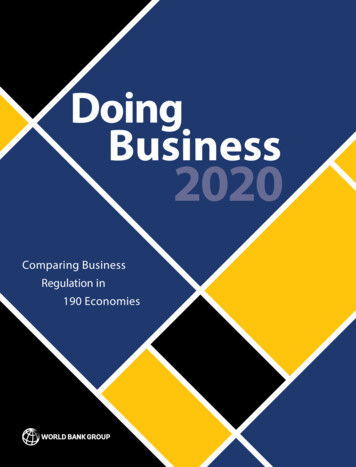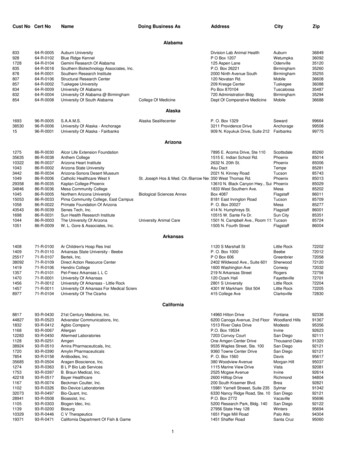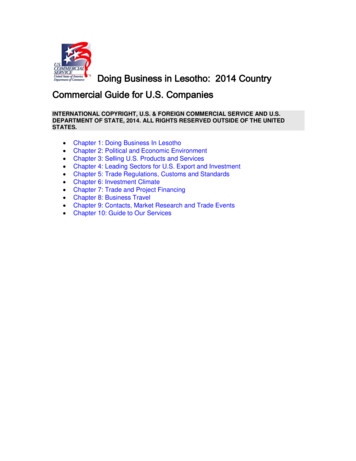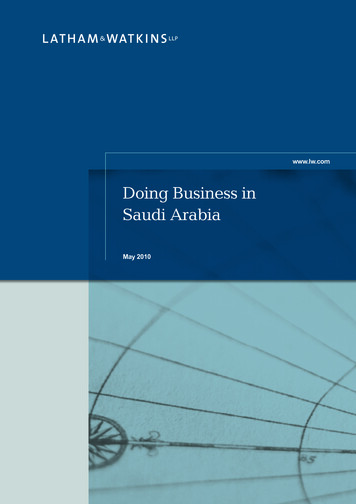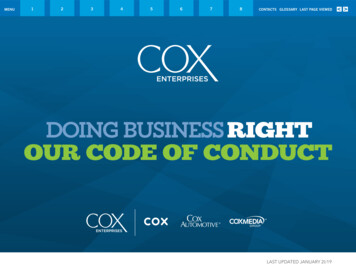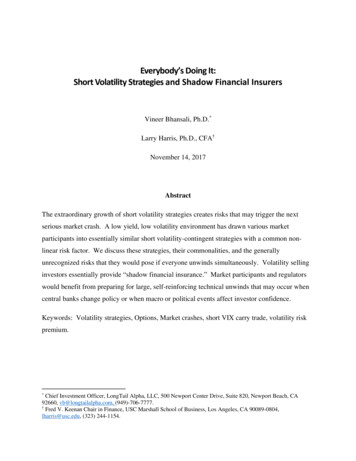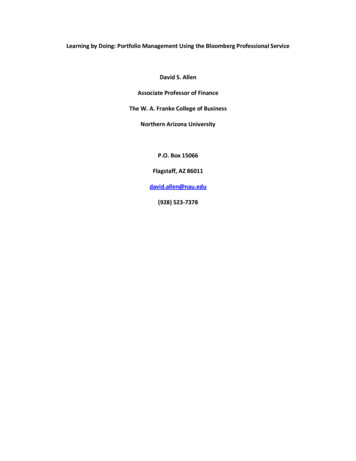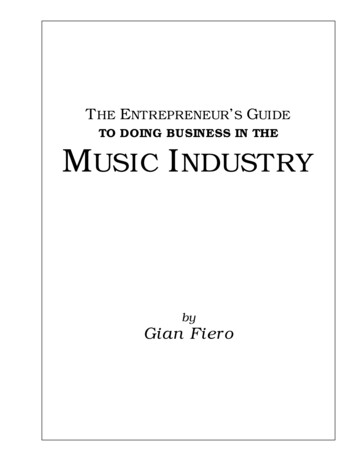
Transcription
THE ENTREPRENEUR’S GUIDETO DOING BUSINESS IN THEMUSIC INDUSTRYbyGian Fiero
Copyright 2005 by Gian FieroAll rights reserved. No part of this guide may be reproduced or transmitted inany form or by any means, electronic or mechanical, including photocopying,recording, or by any information storage and retrieval system, withoutpermission in writing by the author.ii
iii
AcknowledgementsTo all of my clients and the artists I’ve represented over the past 10years: Thanks for choosing me when you have so many choices. Inever forget that your trust in me is more valuable than any service Icould ever offer.To my associates in Northern & Southern California: Thanks for theinspiration, encouragement, and support.iv
v
TABLE OF CONTENTSThe Purpose of This Guide . 1Definition & Overview of This Guide. 5The Real Cash Cows of the Music Industry .11Advice for the Potential Record Label Owner.15Advice for Music Producers .19Playing a Different Tune as a Music Artist .23Taking the Right Angle to Get a Deal .29Approaching Investors .33Message to Potential Investors .37The Personal Manager as an Entrepreneur.41The Power of Attorneys .45Your Step-By-Step Checklist.49Research Resources.53Glossary of Terms.57v
2The Purpose of This GuideThe Purpose of ThisGuide
The Purpose of This Guide3
4The Purpose of This GuideSo you want to succeed in the music business? That’s the assumption I’mgoing to make since you are reading this guide. I’m also going to assume thatyou are a music artist, record producer, label owner, personal manager,potential investor, aspiring entrepreneur, or someone who would just like tolearn more about the business of the music industry and how it operates. If so,this guide was written for you!The use of this guide will help you cut to the chase ofgetting paid without spending years paying your dues.”The use of this guide will help you to “cut to the chase” of getting paid withoutspending years “paying your dues” like so many confused and misguidednewcomers, who tend to get frustrated and stuck in the complex andmysterious maze of the music industry.Once you have read this guide you will be able to identify and understand, atleast on a fundamental level, the most critical business and financial aspectsof the music industry. If making money in the music industry is NOT yourobjective, you may as well stop reading right now.This guide will NOT provide you with all of the information that you will needto succeed in your endeavors; it is intended to be used as a map on yourtreasure hunt for riches in the music industry; it will make the process offinding them a whole lot easier.There is a list of books located in the research resources section of this guidethat are (in my opinion) the most comprehensive books on their subject. Iencourage you to purchase some of them to do research on the music industryto get specific information about reaching your particular objectives. It isimperative that you do thorough research on the industry that you areattempting to succeed in before you invest time, energy, and money.Once you have finished this guide the biggest pieces to the music industrypuzzle will be in your possession all you will have to do is put them intoplace.
Definition & Overview of the Music IndustryDefinition & Overviewof the Music Industry5
6Definition & Overview of the Music Industry
Definition & Overview of the Music Industry7Before you attempt to take the music industry by storm, let’s answer a basicquestion with a not so obvious answer: What exactly is the music industry?You often hear the term used interchangeably with the music business. Thereality is that the music industry and the music business are two separateworlds that overlap. They are interdependent, but not co-dependent on eachother.The music business is the business of financially exploiting music(songs/recordings) and music artists. The music industry is the branch of theentertainment industry that creates financial gain from the music businessand music business related activities, such as music publishing and thepromotion and booking of talent to perform in various venues.The music industry is the division of the entertainmentindustry that creates financial gain from the music businessand music business related activities.Confusing? To many newcomers it is. Just remember this: the term musicindustry is all encompassing and reflective of the various business activitiesthat take place within the music industry.The two terms also carry different connotations in different communities andcircles.The music industry, as a whole, is viewed as a creative business. 1The musicbusiness, however, carries a negative stigma and a (well-deserved) reputationfor deception, thievery, lack of professionalism, and criminal behavior.Many administrative professionals, including entertainment attorneys andmanagers, tend to use the term, music business because they deal with thebusiness affairs of people who work in the music industry.Both terminologies will be used throughout this guide.As in any business, the music industry has its own language that you mustlearn to speak in order to relate to those who may work for or with you. Thereis a glossary of commonly used terms at the very end of this guide that willhelp you decode this language. Now let’s take a closer look at the industriesthat impact and overlap the operations of the music industry.1Read Fredric Dannen’s “Hit Men” if you want to know more.
8Definition & Overview of the Music IndustryThere are basically four categories that all professionals who do business inthe music industry fall into. These categories and occupations are as follows:CREATIVEPERFORMANCE Recording artistsSongwritersRecord producersProduction companiesPerforming artistsMusicians (concert &session) Background vocalists Engineers BUSINESSPROFESSIONAL SUPPORT Major record companies Subsidiaries (of majorrecord companies) Inde pendent recordlabels Publishing companies Music libraries Music licensing Distributors Retailers (record stores) Marketing &Promotions RadioFilmTelevisionCableConcertPromotion/Promoters Night Club Venues InternetEntertainment attorneysPersonal managersTalent/Booking AgentsBusiness ionsAdvertising/PublicityCompanies Industry supportorganizations (*RIAA, NARAS,NMPA, etc.)* Research on the InternetIt’s important to note that some entities, like production companies which arecreative in nature, also serve a business function and may overlap into othercategories. Typically what constitutes this overlap is when their roles,expectations, and relationships change with other professional entities.The entities in the performance categories are in fact, separate and distinctindustries whose business functions and activities not only overlap, but enablethe music industry to prosper and music artists to maximize their income.Presently, the use of the Internet beyond a marketing and promotional tool isstill evolving. Many record labels and music artists are effectively using theirwebsites to disseminate general and specific information such as performancedates, and opportunities for consumers to purchase their music and otherproducts.The process of viewing live performances in real-time via the World Wide Web(web-casting) is also becoming very popular. How lucrative it will be for thosethat produce it and those that provide content for it has yet to be determined.
Definition & Overview of the Music Industry9The music business is a high-risk business. It is driven by profits that areoften elusive to the very music artists who generate revenues for recordcompanies and those who work in the various capacities and occupations thatcomprise and sustain the music industry. The music that we listen to as fansor music lovers is packaged, sold, processed and viewed as “product” byindustry professionals.These professionals, who all serve different functions, are directly or indirectlyresponsible for the sale of that product or the support of the artist whosetalent it embodies. The successful marketing and promotion of music artistsand their product enable record companies to supply more products andfinancially back more music artists.The successful marketing and promotion of music artistsand their product enable record companies to supply moreproducts and financially back more music artists.This is the most important function of a record company, and the greatest benefitof having a record deal to most music artists. Feeding the demand for a musicartist, or a particular style of music, motivates record companies to supplymore of that type of music, and those types of artists. (Ever wonder why thereis so much rap music in the marketplace? Ever wonder why so many femalesingers look like models now?)These sales are achieved through creative and consistent marketing efforts byprofessionals who are dedicated to achieving that end result. These results aregreatly enhanced by the various strategic angles that are devised andimplemented on all levels and facets of the entertainment industries whichoverlap with the music industry (Television commercials, guest appearances,live performances, soundtracks, etc.)Research has concluded, and history will show, that when an entrepreneurialapproach is taken by competent professionals who are trying to claim theirshare in this worldwide 47.6 billion dollar industry, the prospects of obtainingotherwise elusive profits are increased dramatically. When operatingknowledge of the industry is met with ample financial backing, success isalmost assured.The music industry thrives on newness. New artists; new product; new labels,and new venues. They are all an inextricable part of the canvas that dreamsand fantasies are painted on. Unfortunately, the magic potion that turns them
10Definition & Overview of the Music Industryinto reality is money. Most newcomers are high on ambition, and low onfinances. Many cling to the mysterious notion that they just simply have tofind an investor who they will make rich in exchange for their generosity –despite the incredibly high rate of financial failure, which is estimated thatonly 2 out of 10 CD’s on the market will actually make a profit.Record labels have long been considered the home of music artists. Therelationship they once forged was similar to that of a parent and a child. Nowthat child has become a rebellious runaway. The abundance of independentlabels and independent artists are tangible proof of this phenomenon and newbusiness model.Fundamentally, music artists are more educated on the music business, butthe intricacies of “major label” success remain hidden in the inner sanctum ofcorporations who have finely tuned operating systems and an abyss ofresources to maintain the status quo.Financially, the music industry is tainted by perplexing, convoluted, andantiquated accounting practices. Royalty statements tend to be inaccurate andthe proficiency in calculating them is often suspect. There are starkdiscrepancies in the amount of money generated, and the amount of moneyearned. This is partly due to a host of deductions that music artists areunaware of. Performing live (touring) has been, and still is, the most reliablemethod of generating income since the inception of the music industry.For professionals, employment is often hard to come by. The entrepreneur hasthe upper-hand in terms of making money because they aggressively pursueand/or create income opportunities by providing useful, beneficial, or luxuryservices to others who will use them to establish, increase, maintain theirsuccess, or protect their business interests.All professionals in the music industry are really in the service business, justas all music artists are really in the sales business.In the music industry, opportunities that are replete with value –demonstrated and perceived, obvious and not so obvious, are the ones that arecapitalized on by aggressive entrepreneurs, visionaries, middlemen, andnewcomers alike . For most, achieving success in the music industry is reallyno different than achieving success in other industries: it is a result ofsupplying product for which there is a demand and/or creating a demand for aunique product or service that only you can supply.
The Real Cash Cows of the Music IndustryThe Real Cash Cowsof the Music Industry11
12The Real Cash Cows of the Music Industry
The Real Cash Cows of the Music Industry13If you are a newcomer to the music industry, I will save you a great deal oftime on your 2research by telling you, exactly where the major money is. Themajor money is in the ownership and exploitation of copyrights and soundrecordings. These are the real cash cows of the music industry.The major money is in the ownership and exploitation ofcopyrights and sound recordings. These are the real cashcows of the m
the music industry to prosper and music artists to maximize their income. Presently, the use of the Internet beyond a marketing and promotional tool is still evolving. Many record labels and music artists are effectively using their websites to disseminate general and specific information such as performance
